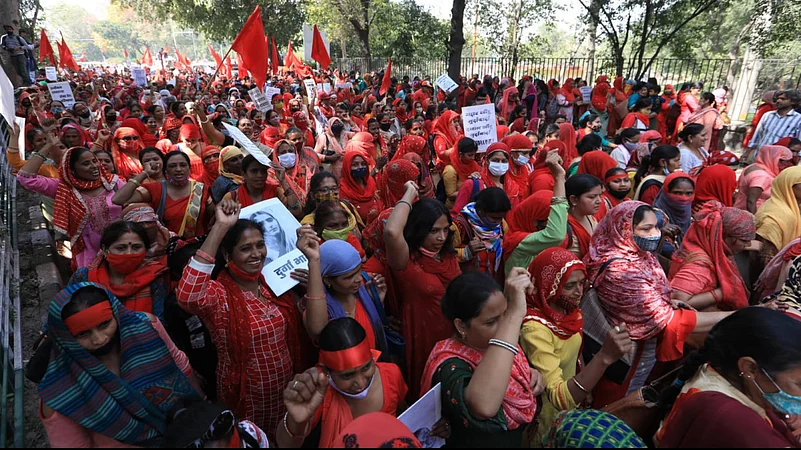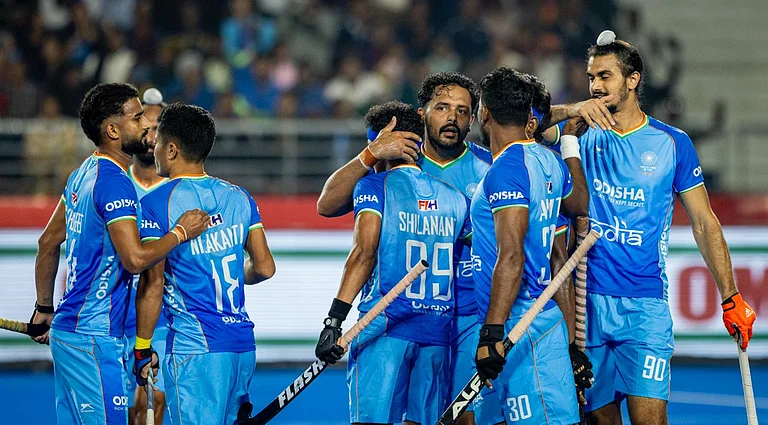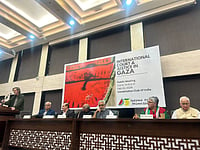‘Aurtey jab tak tang rahegi, jang rahegi, jang rahegi’
(Till the time women are oppressed, protests will continue).
Kamlesh, an Anganwadi worker from Hastal Project, says, “Anganwadi aurtey ko tiraskar kiya jaa raha hai. Iss mahila diwas mein, humari ek ee binti hai ki, humey apna samman dey. (Anganwadi workers are being humiliated. On this women's Day, we have one request, give us respect),” Anjana, from Vishnugarden Project, breastfeeds her 2-year-old son while a crowd of women shouts slogans.
They are among thousands of Anganwadi workers, who assembled at Delhi’s Raj Ghat to hold a rally till Central Secretariat on International Women’s Day. The women healthcare workers have been protesting across different parts of Delhi since January 31 and this time they demand action against Navlendra Kumar Singh, Deputy Director of the Women and Child Development Department (WCD), Government of Delhi for using certain derogatory remarks and language against them.
The protesting workers have been served a show cause notice by the Department to stop the protest and join their work. “We are being intimidated that if we don’t call off the protest, we will lose the job,” says Pushpa, Hamdard Nagar's project. The message from the government has been deemed illegal, unconstitutional and intimidating.
“We have been called 'farzi' (unreal), 'lafangey' (rogue) and whatnot. Why? Just because we have been asking for our rights. Too many objectionable words have been hurled at us, women, for no reason,” says Pushpa, who has struggled as an Anganwadi worker for 25 years.

Some members of the Delhi State Anganwadi Workers and Helpers Union (DSAWHU) on Sunday gheraoed Chief Minister Arvind Kejriwal’s residence demanding an FIR against a government official who allegedly used objectionable language against them. The members have been sitting on a hunger strike as well.
Shivani, DSAWHU president, said that the women workers, who are on a strike pressing for “legitimate and constitutional demands”, are constantly being harassed by the Women and Child Development Department officials. Speaking to the media, she had said, “This officer directly said that the workers who are actively participating in the strike should be beheaded. The hunger strike of Anganwadi workers at Kejriwal’s residence will continue till an FIR is registered against the officer. Our strike will also continue until the government holds negotiations and has a respectable settlement with the union.”
“Many of us have already left the protest and joined back work. I have been personally receiving calls from my supervisors, threatening us to join back. But we shall not. This deaf government needs to hear us out,” says Neelam Rathore, Chandkanti Project.
For weeks, the Union has been demanding an increment in the honorarium of the women workforce in addition to being formally recognised as employees. The workers say that they are deprived of their minimum wage and blame the Arvind Kejriwal government for making false promises over the ages.
Workers across Delhi’s 95 projects gathered today at the rally. Anganwadi workers in Delhi are paid Rs 9,678 and 11,000 helpers are paid Rs 4,839 per month. But they demand that the amount be increased to Rs 25,000 for workers and rs 20,000 for helpers. The last increment was made in 2017. Over five years, Anganwadi workers, who were declared as frontline workers during the harrowing Covid-19 second wave, are raging against the AAP government.
“We received the salary of December 2021 on February 3. The government decided to not pay us our Februrary salary as we have been protesting. Look at us, don’t you see our plight? While Kejriwal goes to other states and brag about the ‘welfare’ of Anganwadi workers, here we are -- taking to the street on women’s day,” says Babita, Karabnagar Project.

Speaking to Outlook, Amit, a representative of the Union, says, “Our demands are at two levels. While the state government must increase their honorarium, the Centre must recognise them as formal sector workers, so that they also have benefits including pension, dearance allowance and so on.”
Bharat, another member of the Union tells Outlook, “Unlike Delhi, the condition of Anganwadi workers in southern states of Kerala and Tamil Nadu is much better. They at least receive Employee State Insurance (ESI), Provident Fund (PF) and so on. The situation here is completely different. In 2017, after days of protest, the workers received a hike. Again, it’s the repetition of the same-old pattern to have us heard.”
During Covid-19, the Anganwadi workers were made to visit homes, distribute food, volunteer at Centres, carry out vaccination drives to remote places, arrange food for infants, yet no safety protocols were followed for them. The women raised an alarm over the lack of compensation and safety.

With no particular work hours to follow and a lack of dignity and respect, agitating women's health workers have decided to continue their protests until their demands are not met.
“Jab mahilaon ko ghar ke kaam chhodkar sadkon pe aandolan karne nikalna padta hai, toh ye koi maamuli baat nahi hoti,” said Rajni, an Anganwadi worker, to Outlook in a previous interview. (When women leave their household chores to protest on the street, it’s not a petty issue.)


























